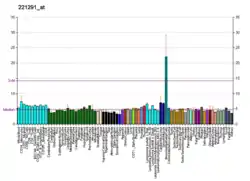ULBP2
UL16 binding protein 2 (ULBP2) is a cell surface glycoprotein encoded by ULBP2 gene located on the chromosome 6.[3][4] ULBP2 is related to MHC class I molecules, but its gene maps outside the MHC locus.[3][4] The domain structure of ULBP2 differs significantly from those of conventional MHC class I molecules. It does not contain the α3 domain and the transmembrane segment. ULBP2 is thus composed of only the α1α2 domain which is linked to the cell membrane by the GPI anchor.[3][4]
ULBP2 functions as a stress-induced ligand for the NKG2D killer activation receptor on natural killer cells.[5][4]
References
- GRCh38: Ensembl release 89: ENSG00000131015 - Ensembl, May 2017
- "Human PubMed Reference:". National Center for Biotechnology Information, U.S. National Library of Medicine.
- Cosman D, Müllberg J, Sutherland CL, Chin W, Armitage R, Fanslow W, Kubin M, Chalupny NJ (Feb 2001). "ULBPs, novel MHC class I-related molecules, bind to CMV glycoprotein UL16 and stimulate NK cytotoxicity through the NKG2D receptor". Immunity. 14 (2): 123–33. doi:10.1016/S1074-7613(01)00095-4. PMID 11239445.
- Radosavljevic M, Cuillerier B, Wilson MJ, Clément O, Wicker S, Gilfillan S, Beck S, Trowsdale J, Bahram S (Jan 2002). "A cluster of ten novel MHC class I related genes on human chromosome 6q24.2-q25.3". Genomics. 79 (1): 114–23. doi:10.1006/geno.2001.6673. PMID 11827464.
- Song P, Zhao Q, Zou M (2020). "Targeting senescent cells to attenuate cardiovascular disease progression". Ageing Research Reviews. 60: 101072. doi:10.1016/j.arr.2020.101072. PMC 7263313. PMID 32298812.
Further reading
- Cerwenka A, Lanier LL (May 2003). "NKG2D ligands: unconventional MHC class I-like molecules exploited by viruses and cancer". Tissue Antigens. 61 (5): 335–43. doi:10.1034/j.1399-0039.2003.00070.x. PMID 12753652.
- Onda H, Ohkubo S, Shintani Y, Ogi K, Kikuchi K, Tanaka H, Yamamoto K, Tsuji I, Ishibashi Y, Yamada T, Kitada C, Suzuki N, Sawada H, Nishimura O, Fujino M (Jul 2001). "A novel secreted tumor antigen with a glycosylphosphatidylinositol-anchored structure ubiquitously expressed in human cancers". Biochemical and Biophysical Research Communications. 285 (2): 235–43. doi:10.1006/bbrc.2001.5149. PMID 11444831.
- Steinle A, Li P, Morris DL, Groh V, Lanier LL, Strong RK, Spies T (2001). "Interactions of human NKG2D with its ligands MICA, MICB, and homologs of the mouse RAE-1 protein family". Immunogenetics. 53 (4): 279–87. doi:10.1007/s002510100325. PMID 11491531. S2CID 33695596.
- Sutherland CL, Chalupny NJ, Schooley K, VandenBos T, Kubin M, Cosman D (Jan 2002). "UL16-binding proteins, novel MHC class I-related proteins, bind to NKG2D and activate multiple signaling pathways in primary NK cells". Journal of Immunology. 168 (2): 671–9. doi:10.4049/jimmunol.168.2.671. PMID 11777960.
- Radosavljevic M, Cuillerier B, Wilson MJ, Clément O, Wicker S, Gilfillan S, Beck S, Trowsdale J, Bahram S (Jan 2002). "A cluster of ten novel MHC class I related genes on human chromosome 6q24.2-q25.3". Genomics. 79 (1): 114–23. doi:10.1006/geno.2001.6673. PMID 11827464.
- Dunn C, Chalupny NJ, Sutherland CL, Dosch S, Sivakumar PV, Johnson DC, Cosman D (Jun 2003). "Human cytomegalovirus glycoprotein UL16 causes intracellular sequestration of NKG2D ligands, protecting against natural killer cell cytotoxicity". The Journal of Experimental Medicine. 197 (11): 1427–39. doi:10.1084/jem.20022059. PMC 2193902. PMID 12782710.
- Rölle A, Mousavi-Jazi M, Eriksson M, Odeberg J, Söderberg-Nauclér C, Cosman D, Kärre K, Cerboni C (Jul 2003). "Effects of human cytomegalovirus infection on ligands for the activating NKG2D receptor of NK cells: up-regulation of UL16-binding protein (ULBP)1 and ULBP2 is counteracted by the viral UL16 protein". Journal of Immunology. 171 (2): 902–8. doi:10.4049/jimmunol.171.2.902. PMID 12847260.
- Eleme K, Taner SB, Onfelt B, Collinson LM, McCann FE, Chalupny NJ, Cosman D, Hopkins C, Magee AI, Davis DM (Apr 2004). "Cell surface organization of stress-inducible proteins ULBP and MICA that stimulate human NK cells and T cells via NKG2D". The Journal of Experimental Medicine. 199 (7): 1005–10. doi:10.1084/jem.20032194. PMC 2211882. PMID 15051759.
- Rohner A, Langenkamp U, Siegler U, Kalberer CP, Wodnar-Filipowicz A (Oct 2007). "Differentiation-promoting drugs up-regulate NKG2D ligand expression and enhance the susceptibility of acute myeloid leukemia cells to natural killer cell-mediated lysis". Leukemia Research. 31 (10): 1393–402. doi:10.1016/j.leukres.2007.02.020. PMID 17391757.
This article is issued from Wikipedia. The text is licensed under Creative Commons - Attribution - Sharealike. Additional terms may apply for the media files.


